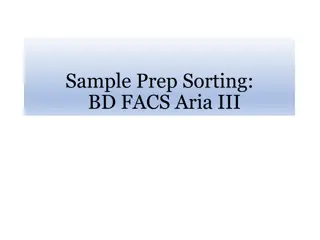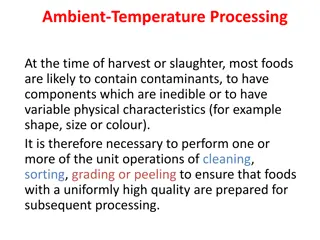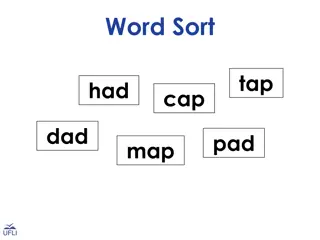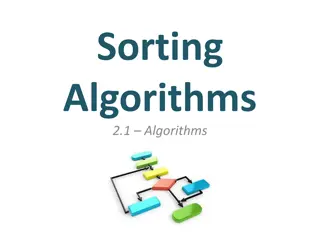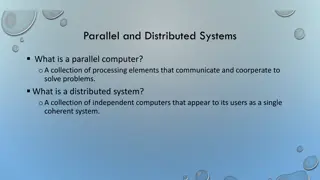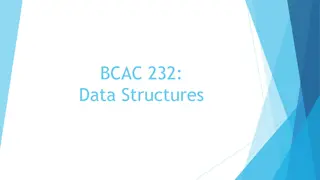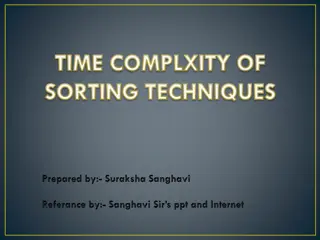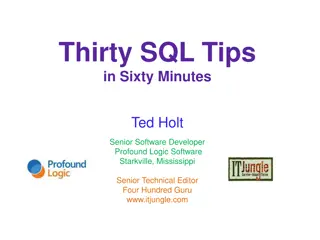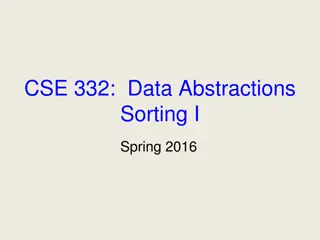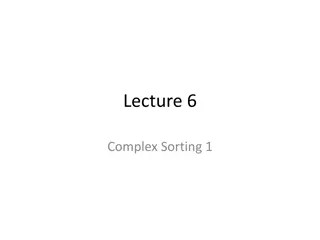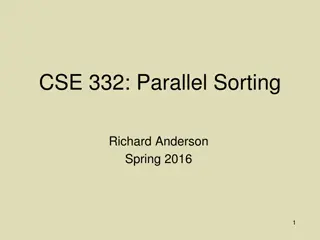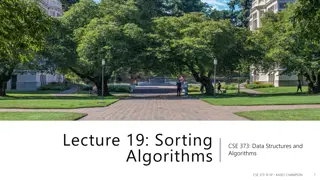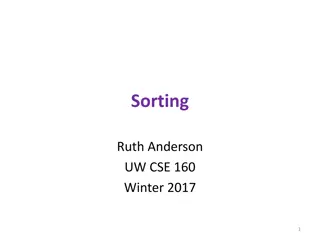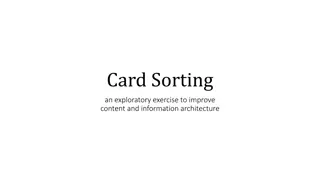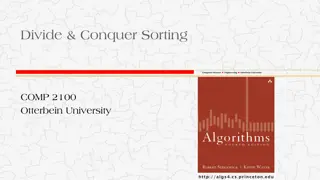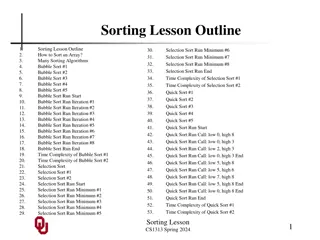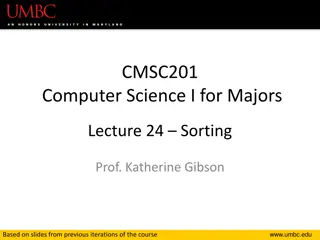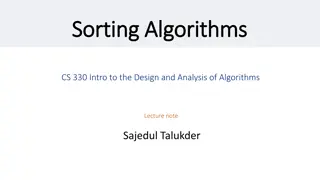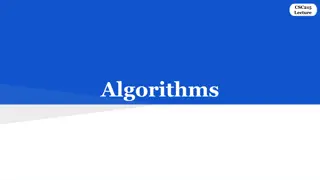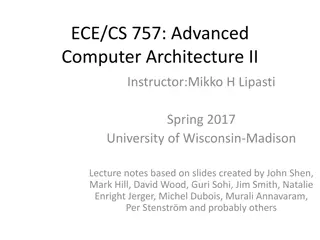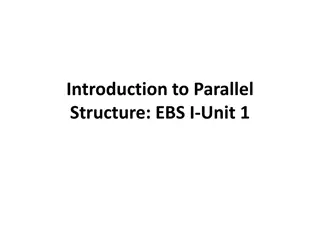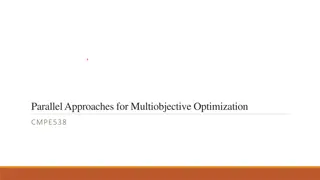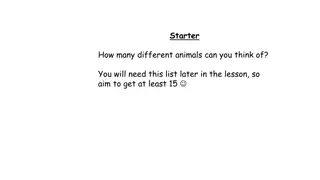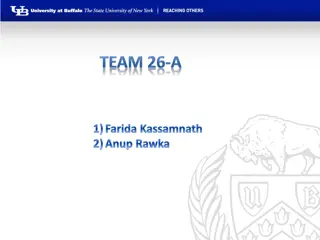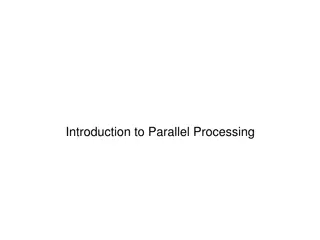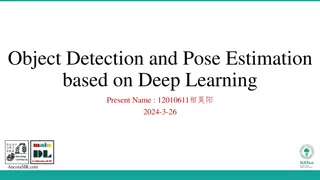Understanding BD FACS Aria III for Efficient Cell Sorting
Learn about the BD FACS Aria III, a sterile cell sorter capable of analyzing up to 15 colors and sorting up to 4 populations simultaneously. Recommended sample concentrations, sorting procedures, and tube preparation guidelines are provided for efficient cell sorting. Discover important tips to ensu
1 views • 12 slides
Food Processing Operations: Cleaning, Sorting, and Grading
Food processing operations such as cleaning, sorting, and grading are crucial to ensure high-quality and safe food products. Cleaning removes contaminants, sorting separates foods based on physical properties like size and color, and grading ensures uniformity. Wet and dry cleaning methods are emplo
1 views • 11 slides
Understanding Parallel and Distributed Computing Systems
In parallel computing, processing elements collaborate to solve problems, while distributed systems appear as a single coherent system to users, made up of independent computers. Contemporary computing systems like mobile devices, IoT devices, and high-end gaming computers incorporate parallel and d
1 views • 11 slides
Engaging Word Sorting Activity for Students
Encourage student engagement with a hands-on word sorting activity involving phonograms. Students copy word cards into categories, read each word, and determine its appropriate category in a fun and interactive manner using a sorting chart.
2 views • 5 slides
Understanding Sorting Algorithms: Bubble Sort and Insertion Sort
Master the concepts of standard sorting algorithms through a detailed exploration of Bubble Sort and Insertion Sort. Learn how each algorithm functions step-by-step, gaining a practical understanding of sorting techniques in computational thinking and programming. Engage in hands-on activities to ap
1 views • 14 slides
Understanding Parallel and Distributed Systems in Computing
A parallel computer is a collection of processing elements that collaborate to solve problems, while a distributed system comprises independent computers appearing as a single system. Contemporary computing systems, like mobile devices and cloud platforms, utilize parallel and distributed architectu
0 views • 11 slides
Methods of Separating Mixtures in Natural Sciences Grade 7
Separating mixtures is an essential part of studying matter and materials. Methods like hand sorting, sieving, and using a magnet are commonly used to separate substances based on physical properties. Hand sorting involves sorting by size, color, texture, and shape, while sieving uses sieves with di
1 views • 18 slides
Understanding Sorting Algorithms in Data Structures
Delve into the world of sorting algorithms in data structures through comprehensive coverage of concepts, performance optimization tips, and associative set/map implementations. Explore various sorting strategies and understand the importance of efficient coding practices for enhanced runtime perfor
0 views • 82 slides
Understanding Sorting Techniques in Data Structures
Sorting is the process of arranging elements in a specific order, be it ascending or descending, for efficient data access. This content covers internal and external sorting, types of sorting techniques like Bubble Sort and Quick Sort, factors influencing the selection of sorting techniques, efficie
7 views • 12 slides
Sorting Techniques: Complexity, Stability, and Cases
This content discusses various sorting techniques, their time complexity in worst, best, and average cases, stability, and types of sorts. It includes a comparison table listing algorithms such as Bubble Sort, Selection Sort, Insertion Sort, Quick Sort, and more, along with their respective complexi
0 views • 10 slides
Mastering Data Cleaning and Sorting in Microsoft Excel
Delve into the intricacies of data cleaning and sorting in Microsoft Excel. Understand the importance of clean data and explore essential techniques for organizing and preparing your data for analysis. Discover efficient ways to utilize Excel's features for data cleansing and how sorting can enhance
0 views • 15 slides
Optimizing Benefits Through Sorting in LHC Magnet Systems
LHC's experience highlights the significant advantages of sorting in magnet systems, such as safeguarding against losses in mechanical and dynamic apertures, minimizing beta-beating, and enhancing field quality. By controlling observable quantities like mechanical aperture, transfer function, and fi
0 views • 8 slides
Understanding Shift Registers: Introduction and Classification
Explore the world of shift registers, including buffer registers, and different modes of operation like serial in/serial out, serial in/parallel out, parallel in/serial out, and parallel in/parallel out. Learn about the construction, operation, and classification of registers in digital systems.
1 views • 24 slides
Understanding Shift Registers in Sequential Logic Circuits
Shift registers are sequential logic circuits used for storing digital data. They consist of interconnected flip-flops that shift data in a controlled manner. This article explores different types of shift registers such as Serial In - Serial Out, Serial In - Parallel Out, Parallel In - Serial Out,
2 views • 9 slides
SQL Tips to Enhance Data Sorting Techniques
Gain valuable insights into SQL tips for optimizing data sorting techniques. Learn how to utilize column numbers for efficient sorting, implement non-alphabetic sorting techniques, ignore case in sorts and comparisons, and access data in arrival sequence using the RRN function. These tips are design
0 views • 44 slides
Understanding Parallel Circuits in Electronics
Explore topics such as resistors in parallel, voltage distribution, Kirchhoff's current law, resistance calculations, and practical applications in parallel circuits. Dive into problem-solving exercises and grasp concepts like current dividers, total resistance calculations, and power distribution i
0 views • 20 slides
Understanding Sorting Algorithms for Efficient Data Management
Sorting algorithms play a crucial role in organizing data efficiently. This content covers the fundamentals of sorting, emphasizing the importance of consistent ordering, space complexity, stability, and time efficiency in sorting algorithms. By understanding these key concepts, one can optimize dat
1 views • 37 slides
Heapsort and Heaps: A Generic Algorithm for Sorting
This content discusses the concept of heapsort and heaps in the context of sorting algorithms. It covers a generic algorithm for sorting a sequence of numbers in non-decreasing order, detailing different implementations and time requirements for inserting and removing elements from a set. A clever c
0 views • 50 slides
Comprehensive Overview of Sorting Algorithms in Computer Science
Explore the intricacies of various sorting algorithms like Shell Sort, Merge Sort, and Quicksort through examples, pseudocode, and analysis. Get ready for an upcoming test with sample problems and revision sessions. Don't miss the deadlines for homework submissions and participation. Dive into the w
0 views • 59 slides
Understanding Parallel Sorting Algorithms and Amdahl's Law
Exploring the concepts of parallel sorting algorithms, analyzing parallel programs, divide and conquer algorithms, parallel speed-up, estimating running time on multiple processors, and understanding Amdahl's Law in parallel computing. The content covers key measures of run-time, divide and conquer
1 views • 40 slides
Overview of Sorting Algorithms in Data Structures
This content covers various sorting algorithms including comparison sorts and niche sorts. It explains the concept of comparison sorts, in-place sorts, stable sorts, and the importance of stable algorithms. Additionally, it delves into different types of sorts, such as Quicksort, Merge sort, and mor
3 views • 22 slides
Understanding Sorting Functions in Python
Explore sorting functions in Python with examples such as sorting lists alphabetically, customizing sort orders, and using sort keys to extract and compare values efficiently.
0 views • 14 slides
Enhancing Information Architecture through Card Sorting: A Comprehensive Exercise
Explore how card sorting can optimize content organization and information architecture. Understand the importance of context, goal setting, conducting card sorting, organizing content, identifying missing content, prioritizing information, and sharing insights for further improvements. Discover the
0 views • 11 slides
Understanding Divide and Conquer Sorting at Otterbein University
Explore the concept of Divide and Conquer sorting in Computer Science at Otterbein University. Learn about the MergeSort and QuickSort algorithms, the design paradigm behind them, and steps involved in MergeSort. Discover how partitioning and merging play crucial roles in sorting sequences efficient
0 views • 38 slides
Overview of Sorting Algorithms
Explore the world of sorting algorithms through a detailed lesson outline covering popular methods like Bubble Sort, Selection Sort, and Quick Sort. Learn how to sort an array, understand the time complexity of different sorting techniques, and discover the intricacies of implementation through code
0 views • 53 slides
Understanding Sorting Algorithms in Computer Science
Delve into the world of sorting algorithms in computer science with a focus on Selection Sort, Bubble Sort, Quick Sort, and Radix Sort. Learn how sorting impacts the efficiency of other algorithms and explore the scalability of different sorting methods. Discover the importance of sorting algorithms
0 views • 37 slides
Overview of Sorting Algorithms and Quadratic Sorting - CS 330 Lecture Notes
Sorting algorithms play a crucial role in computer science and computing tasks, consuming a significant portion of computing power. Various algorithms such as Bubble Sort, Selection Sort, and Insertion Sort are discussed for sorting a list of values efficiently. Quadratic sorting algorithms like Sel
0 views • 30 slides
Parallel Programming Directives and Concepts
Learn about parallel programming directives like Diretiva.parallel and #pragma omp.parallel, which allow code to be executed by multiple threads simultaneously. Explore concepts such as defining parallel regions, setting the number of threads, and utilizing OpenMP directives for parallel for loops.
0 views • 39 slides
Efficient Setup and Maintenance for Sorting Process
Efficiently set up and maintain the sorting process by following key steps such as preparing the instrument and adjusting the angle of the plates, turning on the stream and monitoring its stability, checking droplet images for proper sorting, applying voltage to the plates, and selecting appropriate
0 views • 34 slides
Introduction to Basic Algorithms: Searching and Sorting
Explore the fundamentals of basic algorithms focusing on searching and sorting techniques. Learn about linear (sequential) search, sorting problem complexities, and popular algorithms like Bubble Sort and Selection Sort. Discover the key concepts, terms, and functions involved in search and sort alg
0 views • 15 slides
Understanding Parallel Software in Advanced Computer Architecture II
Exploring the challenges of parallel software, the lecture delves into identifying and expressing parallelism, utilizing parallel hardware effectively, and debugging parallel algorithms. It discusses functional parallelism, automatic extraction of parallelism, and finding parallelism in various appl
0 views • 86 slides
CS260 Parallel Algorithms: Theory and Practice Review
This review covers essential topics from the CS260 Parallel Algorithms course by Yihan Sun, focusing on key concepts such as scheduler programs, cost models, reduce and scan techniques, PRAM models, atomic primitives, small algorithms, the master theorem, and sorting algorithms like Quicksort and Me
0 views • 25 slides
Mastering Parallel Structure in Business Communication
Understanding and implementing parallel structure in business communication is essential for clear, effective, and professional writing. Explore the nuances of parallelism, such as using correlative conjunctions like "not only...but also," to ensure consistency and coherence in your written work. Le
0 views • 21 slides
Understanding Plastic Types: Sorting and Recycling Methods
Explore the process of sorting plastics based on their types using methods like floatation, identification by recycling numbers, and bending tests. Learn how to determine the plastic type through engaging experiments and educational resources. Discover ways to contribute to reducing plastic waste th
0 views • 9 slides
Optimal Round and Sample-Size Complexity for Parallel Sorting Partitioning
This paper explores optimal round and sample-size complexity for partitioning in parallel sorting, discussing parallel partitioning approaches such as sampling and histogramming. It presents a model where processors communicate a set number of keys per round, highlighting the trade-off between round
0 views • 18 slides
Parallel Approaches for Multiobjective Optimization in CMPE538
This lecture provides a comprehensive overview of parallel approaches for multiobjective optimization in CMPE538. It discusses the design and implementation aspects of algorithms on various parallel and distributed architectures. Multiobjective optimization problems, often NP-hard and time-consuming
0 views • 20 slides
Sorting and Grouping Objects Using Venn Diagrams
In this lesson, we explore the concept of sorting objects based on specific criteria and using Venn diagrams to group objects with shared characteristics. Tasks include listing animals, understanding sorting methods, and filling Venn diagrams with student names and food preferences. The visual aids
0 views • 12 slides
Enhancing Sorting Performance with Parallel Algorithms
Sorting is a crucial task in computer science, with data sizes increasing, parallel algorithms offer improved performance. This study explores enhancing Quick Sort using parallel computing, determining optimal processor numbers for efficiency gains.
0 views • 11 slides
Understanding Parallel Processing Fundamentals
This overview delves into the basics of parallel computing, covering parallel memory architectures, programming models, design issues, and parallelizing serial programs. Parallel computing involves leveraging multiple compute resources simultaneously to enhance computational efficiency and solve pro
0 views • 35 slides
Development of Deep Learning-Based Logistics Sorting System
Investigating automated parcel sorting with a robotic arm in a simulated environment using object detection and pose estimation based on deep learning. The project aims to enhance sorting efficiency in response to the increasing volume of parcels in the logistics industry with the application of vis
0 views • 10 slides
